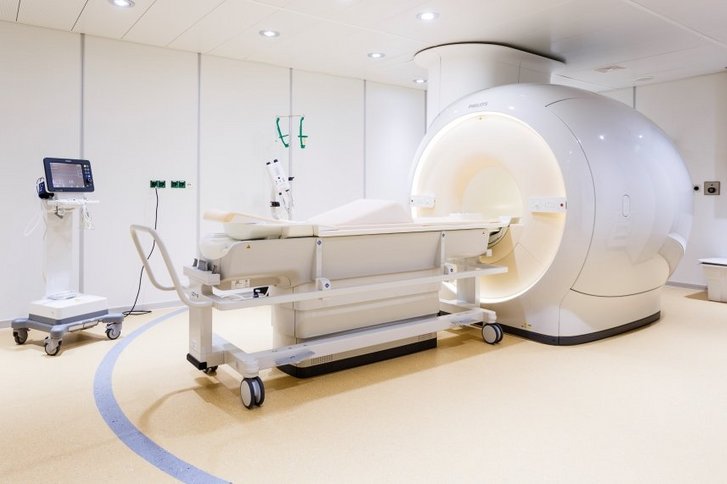Specialist training possible
The interventional and diagnostic CMR unit at the Department of Rhythmology is a training center certified by the German Cardiac Society for trainees working towards all existing levels (I, II and III). In addition, the two cardiologists Priv.-Doz. Dr. Ingo Paetsch and Priv.-Doz. Dr. Cosima Jahnke are qualified instructors accredited by professional bodies in Europe and the US (European Society of Cardiology and Society of Cardiovascular Magnetic Resonance Imaging) and by the State Medical Board of Saxony (specializing in MRT), and have the corresponding training certification.
Review activities by Paetsch/Jahnke for professional Journals
- Circulation
- Circulation: Cardiovascular Imaging
- Journal of the American College of Cardiology (JACC)
- JACC Cardiovascular Imaging
- Journal of Magnetic Resonance Imaging (JMRI)
- European Heart Journal (EHJ)
- European Heart CV Imaging
- Journal of Cardiovascular Magnetic Resonance (JCMR)
- Lancet
Membership of professional bodies
- Deutsche Gesellschaft für Kardiologie (DGK) (German Cardiac Society)
- European Association of Cardiovascular Imaging (EACVI)
- Society of Cardiovascular Magnetic Resonance (SCMR)
- American Heart Association (AHA)
Cardiology/rhythmology CMR research activities at the Heart Center Leipzig focus on
- Completely CMR-controlled electrophysiological interventions with CMR-compatible mapping/ablation catheter systems and 'RealTime' catheter navigation in live 3D models
- Myocardial texture characterization ('substrate detection') prior to ablations of the ventricular myocardium (VT ablations) using ADAS ('Automated Detection of Arrhythmogenic Substrate')
- Precise three-dimensional angiograms of the heart/surrounding vessels with reconstruction and fully automatic data transfer of the segmented 3D models to conventional EP systems for integrated electrophysiological intervention control (EPConverter/EPManager, Software developers: I.Paetsch/S.Hilbert)
- Fibrosis detection and substrate-controlled ablation in atrial fibrillation (DECAAF II Study)
- Artefact-free CMR myocardial texture representation in pacemaker/ICD carriers (establishment of 'Wideband late-gadolinium enhancement' for substrate detection)
- Myocardial texture characterization in tachycardiomyopathy
- Quantification of lung perfusion with embolisms/pulmonary vein stenosis using high-resolution ultrafast CMR perfusion imaging ('k-t SENSE')
- Validation of echocardiographic A. subclavia flow measurement for the grading of aortic valve insufficiencies
Equipment
The entire spectrum of indications of diagnostic and interventional cardiovascular magnetic resonance tomography is available:
- Myocardial ischemia and assessment of myocardial viability (stress CMR examinations with adenosine/dobutamine)
- Differential diagnosis for patients in the chest pain outpatient clinic with thoracic symptoms of uncertain etiology and to exclude the possibility of an acute coronary syndrome
- Myocardial texture characterization (pericarditis/myocarditis, cardiac involvement in inflammatory systemic diseases, infarction scars/fibrosis of the cardiac muscle, transplant rejection diagnosis, etc.)
- Storage disorders and diffuse myocardial texture disorders (T1 mapping, determination of myocardial extracellular volume)
- Valvular and shunt hemodynamics
- 3D and 4D angiograms prior to rhythmological/surgical interventions (e.g. pulmonary vein isolation)
- Substrate detection/characterization prior to ablation of the ventricular myocardium (VT ablations)
- CMR examinations for patients with active implants (pacemaker/ICD carriers)
![[Translate to Englisch:] Zertifiziert von der ESC](/fileadmin/_processed_/c/d/csm_ID01_EACVI_Accreditation_CardiologyRhythmology_CMRLab_Leipzig_a7157f4fa5.png)

![[Translate to Englisch:] Zertifiziert von der ESC](/fileadmin/_processed_/c/d/csm_ID01_EACVI_Accreditation_CardiologyRhythmology_CMRLab_Leipzig_a7157f4fa5.png)